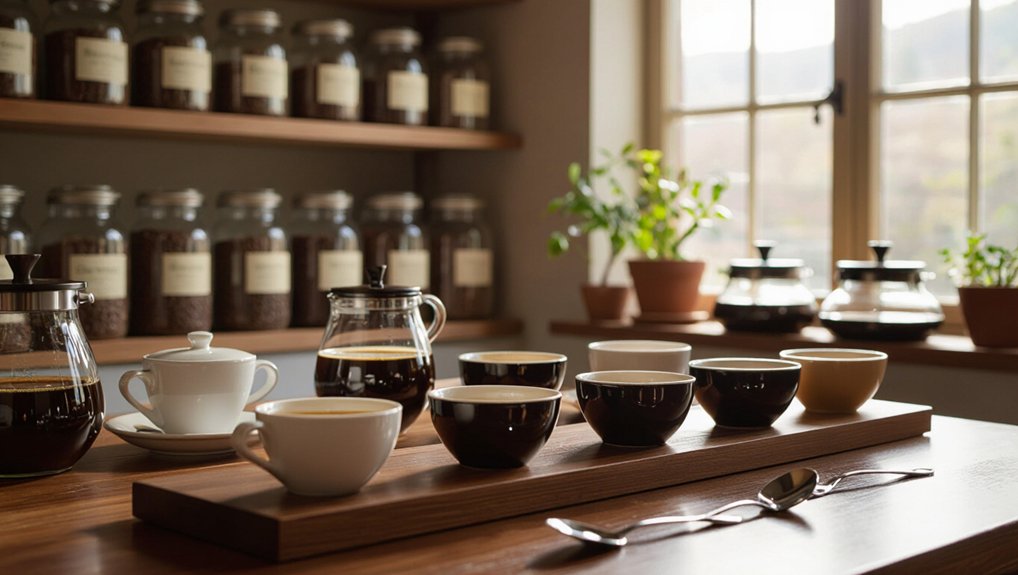Ever wondered where some of the world’s most extraordinary coffee comes from? Many coffee enthusiasts struggle to find truly unique beans that offer something beyond the typical flavors from mainstream growing regions. The answer lies in the Azores—a Portuguese archipelago where volcanic landscapes and maritime climates create something truly magical in your coffee cup.
This remote chain of islands produces beans with a flavor profile that stands apart from anything you’ll find elsewhere on the planet. The mineral-rich volcanic soil and unique growing conditions nurture coffee plants in ways that result in distinctly complex and memorable brews.
In this post, I’ll take you through the fascinating world of Azores coffee, exploring how these islands’ extraordinary environment shapes their beans’ distinctive taste. You’ll discover what makes this Portuguese coffee so special, learn about the traditional growing methods still used today, and find out how you can experience these remarkable flavors for yourself.
Where the Magic Grows: Azores Coffee Geography
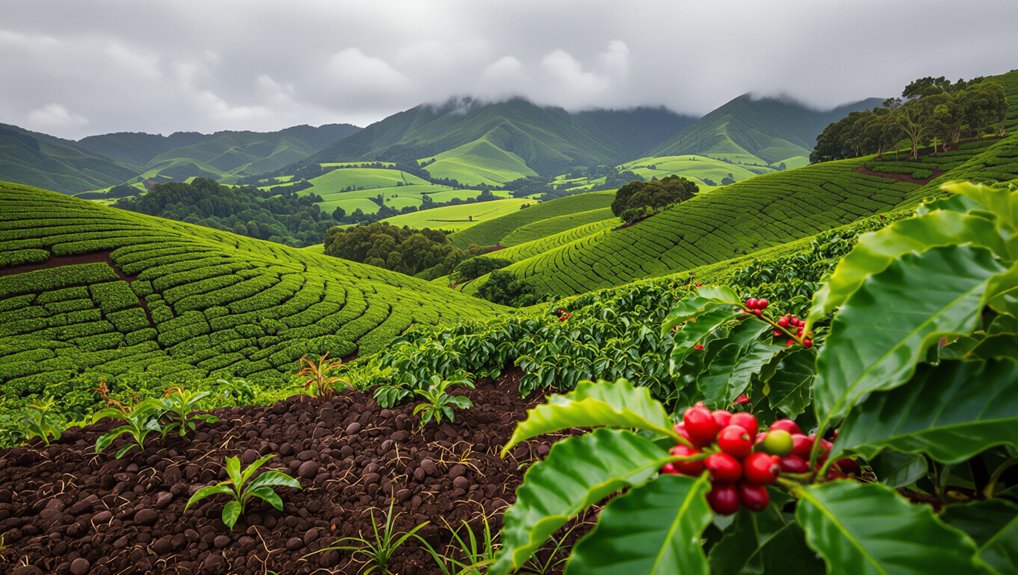
Because the Azores isn’t just another coffee-growing region, it’s a volcanic paradise that transforms coffee cultivation into an art form.
Nestled in the Atlantic Ocean, these islands boast a unique microclimate where coffee plants thrive on volcanic soil between 200 and 600 meters elevation. The Gulf Stream delivers mild temperatures and natural irrigation, creating perfect conditions for exceptional coffee production.
Crater walls and lush vegetation shield delicate coffee trees, while consistent rainfall ensures robust growth.
You’ll discover a coffee industry shaped by isolation, strict agricultural controls, and an environment that nurtures extraordinary beans with unparalleled flavor potential.
Roots and Routes: A Historical Journey of Coffee Cultivation
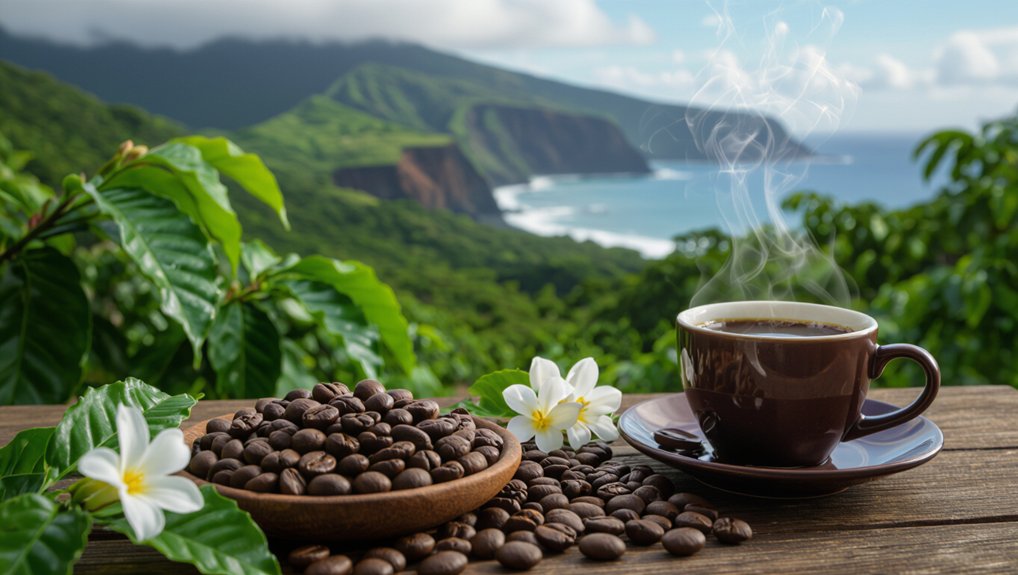
The volcanic landscapes that nurture Azores coffee aren’t just geographic features—they’re storytellers of a rich agricultural legacy.
When disease decimated the orange trade in the 19th century, local farmers discovered resilience in coffee cultivation. They transformed their volcanic soil into thriving coffee plantations, primarily growing large-fruit Arabica beans.
These unique flavors emerged from the islands’ mild climate and high humidity, creating conditions that rival Hawaii’s renowned coffee regions.
Today, coffee enthusiasts are slowly discovering this hidden gem, appreciating how each carefully cultivated bean represents centuries of agricultural innovation and island tradition.
From Volcanic Soil to Your Cup: Unique Growing Conditions
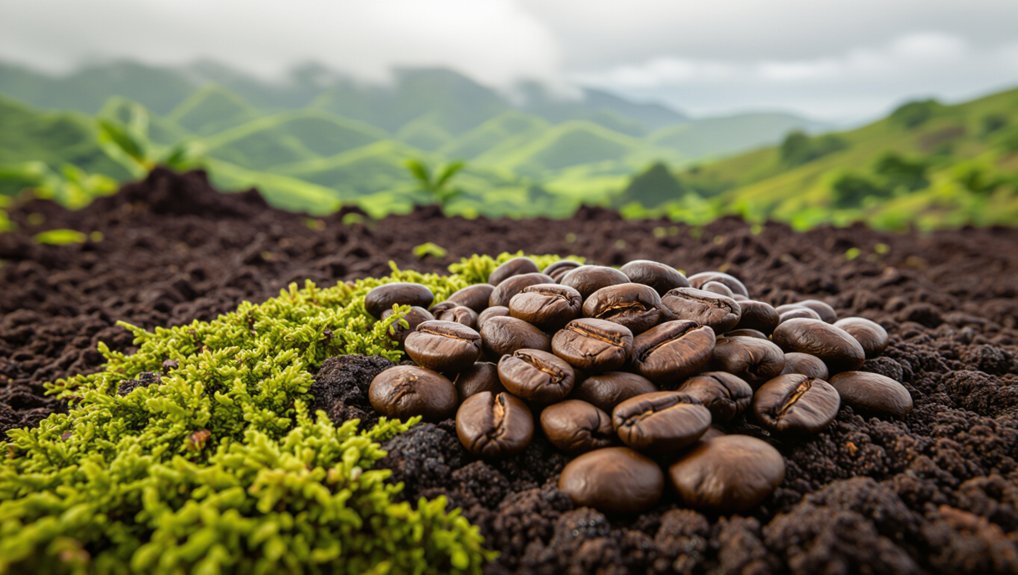
When volcanic landscapes meet maritime climates, something magical happens in coffee cultivation.
In the Azores, volcanic soil creates a unique coffee environment where mild temperatures and natural irrigation from Atlantic moisture nurture exceptional coffee plants.
You’ll discover how the island’s crater walls protect delicate trees, while mineral-rich earth enhances the flavor profile.
These isolated islands provide a pristine growing zone where healthy coffee thrives at altitudes between 200-600 meters.
The result? A distinctive brew that captures the essence of this extraordinary Portuguese archipelago, delivering a taste experience unlike any other coffee you’ve encountered.
Brewing Traditions: How Azoreans Experience Their Coffee

Should the volcanic landscape of the Azores inspire a coffee culture, then Azorean brewing traditions embody a passionate, community-driven experience that goes far beyond mere caffeine consumption.
In this unique specialty coffee haven, locals celebrate São Jorge and São Miguel Arabica through distinctive brewing methods that honor each bean’s character.
Key aspects of Azorean coffee culture include:
- Enjoying fresh roasted coffee during mid-morning breaks in local pastelarias
- Brewing with French press and pour-over techniques to highlight chocolate undertones
- Savoring “bica” espresso as a social ritual in mild temperatures
Tomorrow’s Harvest: The Future of Azorean Coffee Production
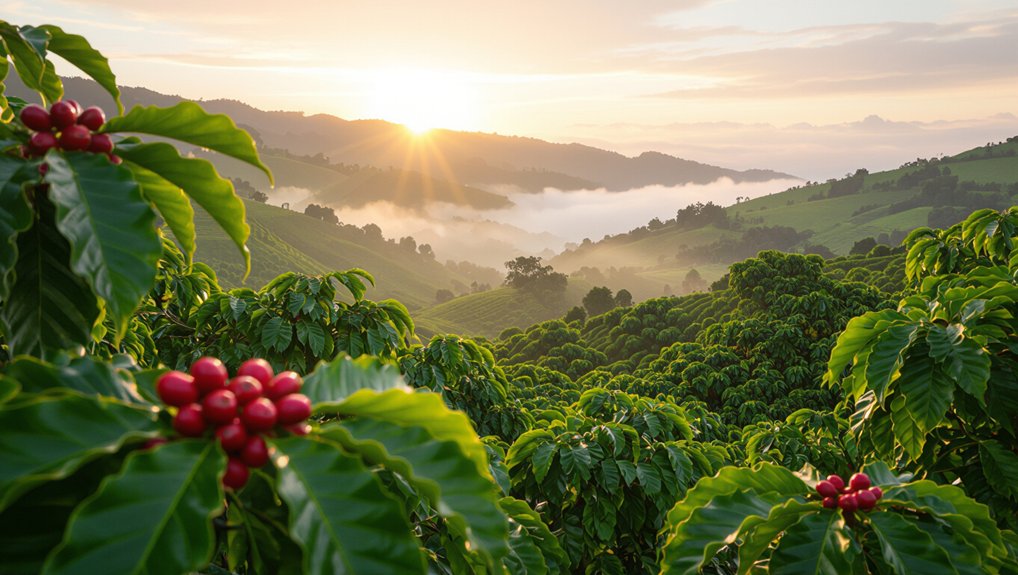
Because volcanic landscapes nurture unique agricultural potential, Azorean coffee production stands poised for a transformative renaissance that’ll excite specialty coffee enthusiasts worldwide.
On São Miguel, sustainable farming practices are reshaping commercial coffee approaches, with local producers targeting Protected Designation of Origin status for their distinctive beans.
Exploring Brazilian Arabica varieties and strengthening partnerships like Delta Cafés will drive market growth.
The regional government’s strategic investments signal a robust future for Azorean coffee culture.
We’re witnessing a delicious evolution—from small-scale production to an emerging global specialty coffee destination that celebrates the islands’ rich volcanic terroir.
Frequently Asked Questions
What Is the Signature Dish of the Azores?
I’ll tell you about Cozido das Furnas, a mouthwatering stew cooked underground using volcanic heat. It’s packed with meats and local vegetables, slow-simmered in the earth’s natural warmth, creating a truly unique Azorean culinary experience.
Does Coffee Grow in the Azores?
Yes, coffee grows in the Azores! I can tell you that volcanic soil, mild climate, and perfect altitudes between 200-600 meters help local producers cultivate around 200 metric tons of high-quality Arabica coffee annually.
What Is the National Dish of the Azores?
I’ll tell you about Cozido das Furnas, the Azores’ national dish. It’s a hearty stew cooked underground using geothermal heat, featuring various meats and vegetables, traditionally prepared in the volcanic Furnas Valley on São Miguel Island.
What Fruit Grows in the Azores?
I’ll tell you about the Azores’ fruit bounty! Pineapples, passionfruit, bananas, and figs thrive here. You’ll also find guavas, cantaloupes, berries, and oranges growing in our rich volcanic soil, creating incredibly sweet and flavorful produce.
In Conclusion
I’ve tasted coffee from around the world, but Azores coffee captures something truly special. These volcanic islands aren’t just a picturesque backdrop—they’re a living, breathing coffee ecosystem. From mineral-rich soils to time-honored brewing traditions, Azorean coffee represents more than a drink; it’s a cultural expression. As sustainable practices take root, I’m excited to see how these islands will continue shaping the global coffee landscape, one extraordinary bean at a time.





